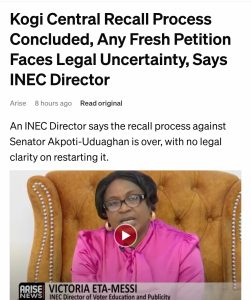Editorial: Lessons from the Failed Recall of Senator Akpoti-Uduaghan
3 min read
— By Eculaw Media
The recent failed attempt to recall Senator Natasha Akpoti-Uduaghan has revealed critical shortcomings in the regulatory framework governing the recall process in Nigeria. As the Independent National Electoral Commission (INEC) reflects on this event, it must take this opportunity to implement meaningful reforms to strengthen its role as the arbiter of democratic processes in the country.
At the crux of the issue lies Section 69 of the Nigerian Constitution, which grants constituents the power to initiate a recall of their elected representatives. While the spirit of this provision intends to empower voters, the absence of specific rules and regulations to guide the process has put INEC in a precarious position. The agency has been thrust into a situation where it appears ill-equipped to manage the complexities of recall petitions effectively.
One of the most glaring issues surfaced during the Senator Akpoti-Uduaghan recall attempt: the startling lack of limitations on how often a group can initiate a recall. This oversight raises an absurd possibility where constituents could repeatedly petition to recall the same lawmaker, with no repercussions for failing in past attempts. Such a scenario raises questions about the sustainability of INEC’s resources and its ability to maintain operational focus. If the same group can file new petitions week after week, rather than engaging in more constructive political discourse, INEC risks being overwhelmed by an incessant stream of recall requests, effectively paralyzing its broader mission.
To prevent such dysfunction, INEC must establish clear guidelines delineating the frequency with which recall attempts can be made, perhaps implementing a waiting period of six months or even twelve months between petitions. Such a rule would discourage frivolous attempts and ensure that the recall process serves its intended purpose—offering a viable means of accountability rather than a harbinger of incessant political strife.
Moreover, the equity of the recall process itself demands attention. INEC should clarify and regulate the campaign activities permissible during a recall attempt. Both the party seeking the recall and the lawmaker facing it should be afforded an equal opportunity to mobilize their supporters through rallies or other forms of campaigning. Otherwise, the fairness of the process is undermined, and the potential for manipulation and undue influence grows. If one side is allowed to campaign freely while the other is banned from campaigning, the very foundation of a democratic exercise is compromised.
Finally, INEC’s approach to handling deficiencies in recall petitions must be reassessed. When faced with incomplete submissions, such as a petition lacking crucial information, INEC should have defined protocols for addressing these defects. Should it outrightly reject an incomplete petition, or should it guide petitioners on remedying these shortcomings? The handling of petitions is crucial, and clear guidance can help maintain the integrity of the process while still enabling genuine constituents’ concerns to be addressed effectively.
While we commend INEC for the eventual outcome of the Senator Akpoti-Uduaghan petition—demonstrating responsiveness to emerging political realities—this episode is a clarion call for reform. As the electoral body moves forward, it must take decisive action to shore up its regulatory framework. By instituting comprehensive rules governing the recall process, INEC can better protect against abuse, enhance the democratic process, and reaffirm its role as a fair and impartial overseer of Nigeria’s electoral integrity. The lessons learned from this recent episode must not be lost; rather, they should serve as a foundation for a more robust system that upholds the principles of democracy.


